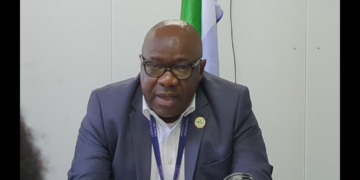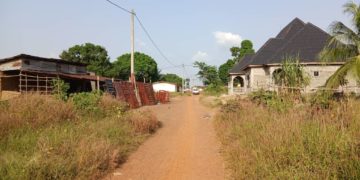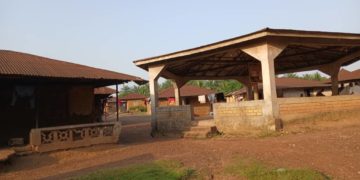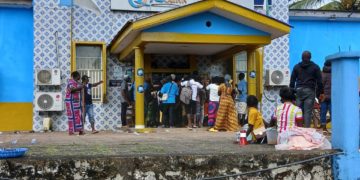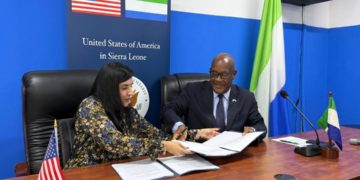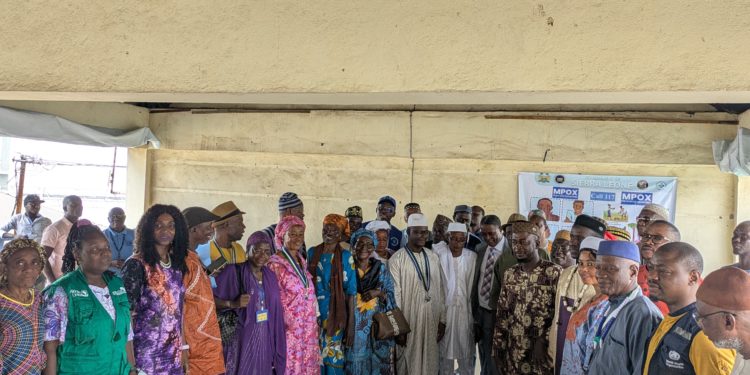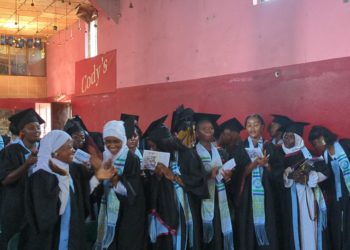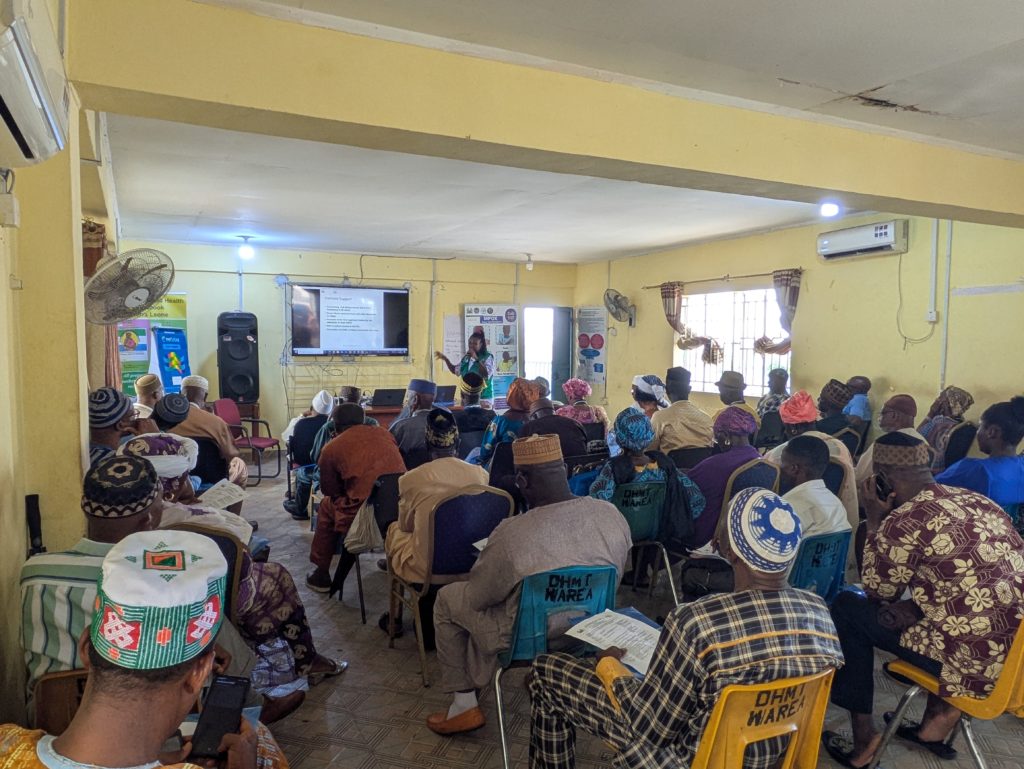
By Kemo Cham
Officials of the National Public Health Agency (NPHA) Sierra Leone on Tuesday made a passionate plea for the support of tribal authorities in efforts to break the chain of transmission of the Mpox virus in the country.
The agency hosted tribal leaders from the Western Region at the District Health Management Team (DHMT) in Cline Town, as the country intensifies its response to the epidemic.
The Western Region (comprising Western Area Urban and West Area Rural), is the most affected by the epidemic, accounting for about 70 percent of national cases, data from the NPHA shows.
Mpox, previously known as monkeypox, is a virus that causes fevers, headaches, and painful boils on the skin. It can spread from infected animals to humans, and from person to person through close physical contact, including sexual intercourse. Sierra Leone recorded its first case in the ongoing epidemic in January 2025. Within three months, it became one of the four high burden African Union member countries. But data from the Africa Centers for Disease Control and Prevention (CDC) in the last few weeks have shown continued reduction in cases across the continent, including in Sierra Leone. The NPHA data also show similar trend.
But officials warn that sustaining the downward trend will require sustained efforts, hence the intensification of community engagement.
Tribal heads are crucial to achieve this, says Thomas Kaku Harding, District Social Mobilization Coordinator at the Western Area Urban DHMT.
“We are entering another phase of the fight,” Mr Harding told the tribal leaders in the conference hall of the DHMT at Cline Town, east end of Freetown.
As at Tuesday, August 19, 2025, Sierra Leone had recorded a cumulative confirmed cases of 5,149, with 52 fatalities. The Western Region has a combined 3,886 cases, with Urban having the highest – 2854 cases. The authorities have identified 11 hotspots where most of the cases in the district are coming from, among them some of the most congested slum communities in and around Freetown.
Among the issues identified as obstacles to stopping the transmission of the virus in some of these communities include refusal to comply with community health workers. There are also concerns about rising reports of stigmatization of survivors of the virus. Health authorities say stigmatization in particular has huge negative effect on the national response efforts, hence the need for the intervention of the traditional leaders.
“It is all about the fight to maintain zero. We cannot end this fight without your help,” Mr Harding, the District Social Mobilization Lead, told the traditional leaders.
The NPHA data reveals a fluctuation trend in cases. The Agency says the goal is to maintain it at zero cases.
“If we want to maintain the zero trend, we cannot relax,” stressed Harding.
In Sierra Leone, tribal chiefs hold significant traditional and administrative roles, including responsibility for local justice, conflict management, and land distribution. They play a crucial role in maintaining order, preserving customs, and promoting development within their communities.
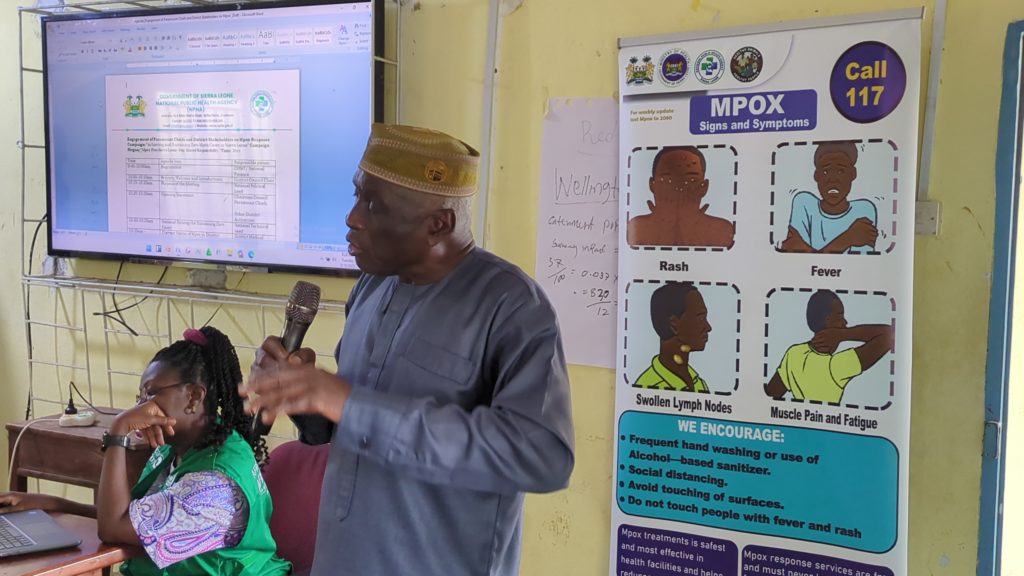
Chiefs representing all the tribal groups in the Western Area attended the four-hour long meeting that also discussed the role of religious and other community leaders in the fight against emergencies like Mpox. Among them is Chief Sahr Orlando Gbekie, popularly known as S. O Gbekie, who is the tribal head of the Kono people and chairman of the Council of Tribal Heads in the Western Region. While thanking government for acknowledging their roles as tribal leaders, Chief Gbekie appealed to his colleagues to endeavor to live up to expectations by continuously sensitizing their subjects.
“We are in the communities. We have direct link to our people. We have their ears. We can help the Ministry of Health defeat this virus,” he said.
“Cooperation is a two-way street. After being informed, we will also endeavor to convey the message,” he assured the health authorities.
The NPHA collaborated with the DHMT, the Ministry of Health and the Local Government Ministry to mobilize the traditional leaders.
The representative of the Local Government Ministry, Josetta O. Campbell, spoke about the importance of factoring women in the discussions on Mpox and emergency response in general.
“Women suffer the most during emergencies,” she noted.
“If the woman falls sick, everyone in the home becomes susceptible to the sickness…My message to you is that as tribal heads, let’s always engage the women, to help them understand the messages. This is because they are in the homes, the markets…,” she added.
Presidential Adviser, Alpha Kanu, praised the idea of engaging tribal leaders in efforts to get Sierra Leone finish the fight against Mpox. He noted that as the most populated part of the country, the Western Region should serve as example in such a national effort.
According to Kanu, Sierra Leone’s history dealing with health emergencies is laden with lessons that can make dealing with Mpox easier, as has already been demonstrated.
“Everybody has a role to play,” he said. “Our ability to use the community and the leaders of the communities are what enabled us to end those epidemics. And we must do same now.”
Mr Kanu also praised the NPHA Executive Director, Prof. Foday Sahr, for his leadership in fight against Mpox. He also hailed the political will displayed by President Julius Maada, citing the timely disbursement of USD1.5million by his administration towards the effort.
Tuesday’s meeting witnessed presentations on the current state of the response by technical experts, including the NPHA Programmes Manager for Surveillance, Dr Joseph Sam Kanu; the surveillance officer at the DHMT, Fatmata Bangura, and the Public Relations Officer of NPHA, Rachel Kuyembeh. Dr Kanu, in his presentation, emphasized the importance of early detection and treatment and therefore appealed to the tribal leaders to help sensitize their subjects on the need to report all suspected cases of the virus.


